Hezbollah Wants US Sanctions Waiver To Import Iranian Fuel

Lebanon's Hezbollah chief Hassan Nasrallah repeated calls Monday for the cabinet to seek a US sanctions waiver to import Iranian fuel amid crippling shortages.

Lebanon's Hezbollah chief Hassan Nasrallah repeated calls Monday for the cabinet to seek a US sanctions waiver to import Iranian fuel amid crippling shortages.
Nasrallah said the total blackout that occurred on Saturday when Lebanon's two largest power plants ground to a halt was like a "clinical death" for the country.
The Iran-backed Lebanese Shi'ite Hezbollah group has been coordinating Iranian shipments of fuel oil and gasoline for Lebanon since August as shortages spread amid an economic meltdown, despite U.S. sanctions on Iranian oil sales.
However, so far it is not clear if Hezbollah delivered any fuel to the country’s power stations or how the fuel was used.
Lebanese Prime Minister Najib Mikati has said the Iranian shipments constitute a breach of his country's sovereignty.
Iran sends the fuel oil shipments organized by Hezbollah to the port of Baniyas in Syria and from there they are transported by truck to Lebanon.
Iran's Foreign Minister Hossein Amir-Abdollahian, on a visit to Beirut last week, said his country was ready to build two power plants in Lebanon, one in Beirut and the other in the south of the country, in a period of 18 months. The offer is more of a publicity stunt as Iran itself is gripped by power shortages unable to meet demand.
On Monday Nasrallah urged the cabinet to respond to his offer.
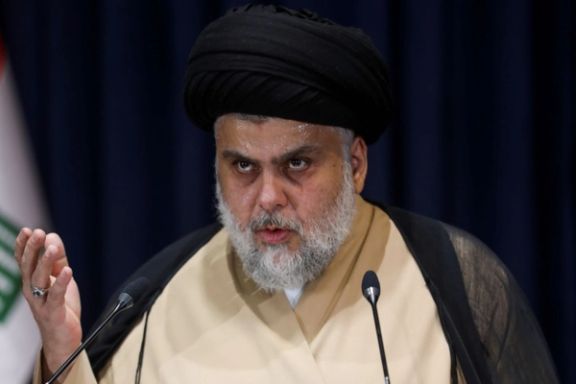
Initial results suggesting Shia cleric Moqtada Sadr had won more seats than expected in Iraq’s election Sunday may not shake a view that the poll will change little – in Baghdad or the region.
Even with the 73 seats claimed by a Sadr spokesman would leave him a minority in the 329-strong parliament with the likelihood of weeks if not months of horse-trading before a prime minister and government are appointed.
While not running for parliament, former intelligence chief Prime Minister Mustafa al-Kadhimi has been expected to seek a second term in the post he assumed in May 2020 as a consensus figure least antagonistic to other leaders.
In a reflection of Iran’s influence in its neighbor, Iraq’s Shafaq daily Monday quoted a government source that General Esmail Ghaani, commander of the Revolutionary Guards (IRGC) extra-territorial al-Quds group, had met officials and leaders in Baghdad within 24 hours of polls closing to discuss next steps.
The election turnout was put at just 41 percent of 25 million voters by the country’s electoral commission, the lowest of any parliamentary election since the United-States-led 2003 invasion overthrew Saddam Hussein.
Response to protests
The election was called in belated response to the ‘Tishreen’ (October) protests in 2019, in which 600 people were killed, but few expect the poll, contested by over 100 parties and blocs, to lead to the significant changes protestors demanded.
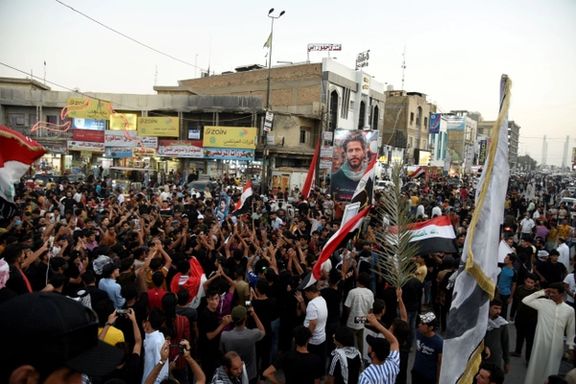
Hopes that independents might jolt the grip of the party machines – or even reduce corruption and tackle power cuts and a decayed infrastructure – appear to have floundered. Anecdotally many young people, who led the protests, didn’t vote.
Iraq’s government, well used since the US-led 2003 invasion to mediating between Iran and US, has in recent months brokered talks between Iran and Saudi Arabia. These efforts are likely to continue, even if slowed by any transition in Baghdad.
The Shia-dominated groups have both close ties to Tehran and working relationships with Washington, which has around 2,500 troops in the country and is pledged to restrict them to an advisory role by year end. All parties and groups pledge reform.
Alliances linked to Tehran
The State of Law coalition, formed in 2009, includes eight parties. The largest, Dawa party, is led by Nouri al-Maliki, who stepped down as prime minister in 2014.
The rival National Wisdom movement, formed this year, is led by former prime minister Haidar al-Abadi and Shia cleric Ammar al-Hakim.
The Aqed al-Watani bridges the Sunni-Shia divide, including the Iraqi Islamic Party, a long-established Sunni group, and Falih al-Fayyadh, leader of the Popular Mobilization Forces (PMF), the state-cum-independent militias links to Iran’s IRGC.
The Fatih alliance, also includes PMF figures, like Hadi al-Amiri, who heads the Badr Organization, a group originally armed by Iran in the 1980sand 90s that has evolved into a political party.
There are two mainly Sunni groupings – the Taqadum alliance and the Azm alliance. In the Kurdish provinces, most support will as usual go to the Kurdistan Democratic Party (KDP) and Patriotic Union of Kurdistan (PUK).
Of 329 seats, 237 are elected in Iraq’s 18 provinces, with 83 reserved for women and nine for religious minorities. Parliament in turn elects the president and prime minister.
A nationwide poll by the al-Rafidain Center for Dialogue, taken between September 25 and October 5, found a level of support for the Sadr movement that would have given it around 47 seats, fewer than it won in 2018 when in alliance with the Communist Party and smaller groups.
The poll found 42 percent of respondents thought the election was transparent while 42 percent lacked any trust in it. But 70 percent said they did not expect candidates to deliver on any promises, with the highest confidence in Anbar and Erbil provinces, strongholds respectively of Sunni Arab parties and the KDP.
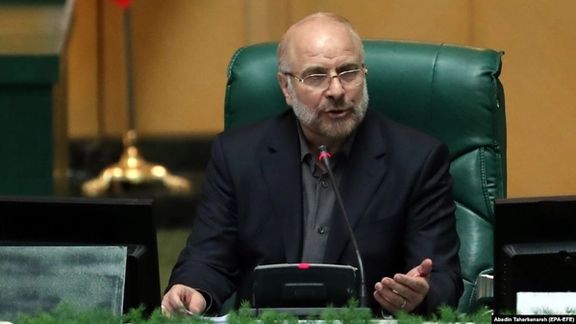
The speaker of Iran’s parliament on Monday defending uranium enrichment demanded the lifting of US sanctions “as a first step” to revive the 2015 nuclear deal.
Mohammad Bagher Ghalibaf said the US should lift its ‘maximum pressure’ on Iran and referred to Tehran’s uranium enrichment effort as something mandated by legislation tied to the removal of US sanctions.
Meanwhile, in an interview on Iran's state television Sunday evening, Hossein Shariatmadari, the editor of Kayhan newspaper, which is close to Supreme Leader Ali Khamenei's office, likened the disputed 2015 nuclear deal with world powers to "a stinking dead body Iran should get rid of at once."
The statement by the influential editor who often echoes Khamenei's ideas may indicate that although the Supreme Leader has effectively consolidated his hardliner control by having Ebrahim Raisi, a like-minded protégé as president, more hardliner supporters are still showing defiance, a tool Tehran often uses to gain leverage.
Iran engaged in six rounds of talks with the West form April to June over reviving the Joint Comprehensive Plan of Action (JCPOA), until Tehran stopped attending. Shariatmadari reiterated that Iran will not gain anything by returning to the JCPOA.
Shariatmadari claimed that "This is no negotiation," citing Iran's security chief Ali Shamkhani as saying that that "the US side is suggesting lifting only some of the sanctions imposed by the Trump administration."
The remarks by Shariatmadari are made against a backdrop of statements by other Iranian officials. One of these statements was made by nuclear chief Mohammad Eslami who insisted that Iran is continuing 20 percent uranium enrichment and has stockpiled over 120 Kilograms of enriched uranium. Despite its defiant appearance, the statement may indicate that Iran is doing so only to have a bargaining chip during the talks.
Last week, moderate newspaper Et'tela'at in Tehran challenged a statement made by the Minister of Economy Ehsan Khandouzi who had said: "In order to control inflation we need to increase oil sales, find access to the country's frozen assets abroad and stop borrowing money from the Central Bank." The daily and several Iranians who commented on social media reminded the minister of the importance of negotiations with the United States and said that Khandouzi should explain how these goals can be attained while the sanctions are still in place."
A highly educated man, the Minister of Economy probably knew the answer, but he let the newspaper and social media users raise the point as it was not in his interest to say in a straightforward way that Iran needs to start negotiations urgently.
Foreign Minister Hossein Amir-Abdollahian's has repeatedly said that Iran is prepared to return to the talks soon. He has also said releasing Iran's assets in South Korea might help facilitate the resumption of the talks, giving a clue to the Americans about where to start.
Iranian commentator and foreign policy analyst Rahman Ghahremanpour observed in a tweet that Amir-Abdollahian “is in a difficult position. On the one hand, he needs to keep the people hopeful in the revival of the JCPOA, and on the other hand, he has to pretend that the situation has changed with the coming to power of the Raisi administration and Iran's positions have toughened. Striking a balance between the two is a very difficult task, particularly at the beginning of his career as foreign minister."
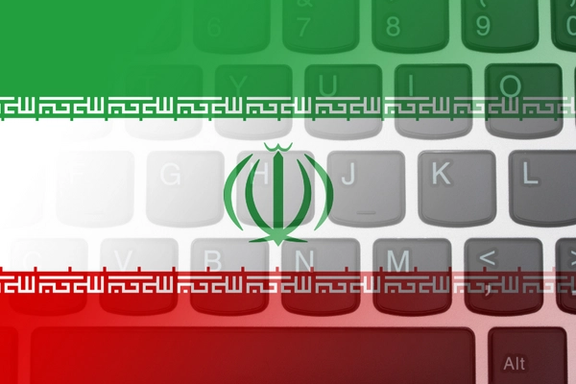
Media in Iran are reporting about increasing disruption in internet connectivity in the past few weeks, as parliament debates more cyber restrictions.
The reports say that for the past two months bandwidth has been reduced and users have a hard time connecting to social media and websites. This coincides with hardline President Ebrahim Raisi taking office in early August.
Slowing down the internet is one way of censorship by authorities in Iran, while blocking individual websites and apps is a more targeted approach.
Meanwhile, the parliament, also dominated by conservatives and hardliners, is reviewing a bill that would restrict access to international social media platforms to force users to download local apps that are surveilled by security agencies.
Iran has restricted access to the internet for two decades and popular social media platforms such as Facebook and You Tube for the past ten years. An overwhelming majority of Iranians routinely use circumvention software to go around government blockages.
The parliament has designated a six-member commission to review the proposed legislation. All six members are proponents of further restricting the internet.
One problem for the government is the increasing role of some apps, such as Instagram in commerce. Many small businesses in Iran now rely on this option to attract and serve customers.
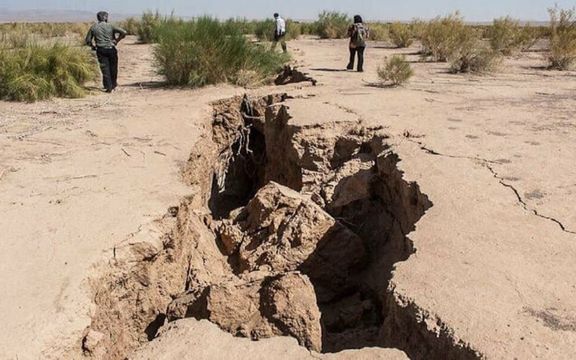
Extraction of underground water around Esfahan, which Iranians call "half the world," is threatening the city's historical monuments and international airport.
Some environmental activists have claimed the airport's tower is now leaning "like the tower of Pisa," which inclines 10 degrees. In fact, the tower has reportedly tilted 3 degrees, hardly noticeable by the naked eye or in photos.
There are photos on social media of cracks in the ground around the airport, and of hollows in and around Esfahan’s historical buildings and monuments.
Environmental activists have also in a letter to the Deputy Prosecutor-General Reza Khoshnudi demanded the prosecution of those responsible for what they call an “environmental disaster” befalling the city and its residents

Director-General of the Geological Survey and Mineral Exploration of sfahan Province, Reza Eslami, on Monday told the Iranian Students News Agency (ISNA) that surveys were underway to assess structures at the airport including gas and fuel pipes and declined to offer immediate comment on the tower.
Eslami said expedient measures were urgently needed, and that if water extraction continued at the same volume land subsistence would affect airports, power plants, and refineries. "There will be no Esfahan in such circumstances," he suggested.
Land subsidence is not limited to Esfahan and its surrounding plain. In many other areas in Iran cracks and huge hollows that resemble meteor craters have appeared in the ground in recent years. Ali Saberi, a geologist told local media that one million hectares of land in the country is affected by subsidence and the main cause is unlimited extraction of ground water.
Land subsidence − which can occur for many reasons including human activities like mining, extracting underground water, petroleum, or gas − is a growing problem in many other places including Mexico City where a growing population of 10 million has resulted in the exhaustion of underground water resources.
The problem of land subsidence in Esfahan has been exacerbated by recurrent droughts in recent decades and the use of underground water and rivers by agriculture and industries. Esfahan's famous Zayandeh Rud, the largest river in central Iran, has for years run dry most of the year. Farmers in Esfahan province have protested they are not receiving a due share of the river's waters, which is being used by other provinces.
Some blame the water situation on an emphasis in achieving self-sufficiency in agriculture, including water-intensive crops such as rice and other grains, which was the aim of many governments even before United States ‘maximum pressure’ sanctions. Supreme Leader Ali Khamenei in 2000 and 2001, promoted an increase in population and self-sufficiency in wheat and rice as the main goal of agriculture.
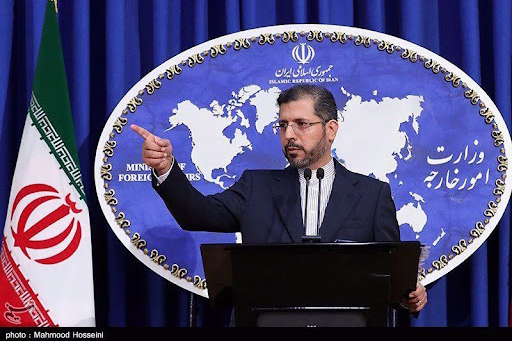
Iran will not tolerate Israel’s presence near its borders, the foreign ministry spokesman told reporters on Monday, referring to tensions with Azerbaijan.
Saeed Kharibzadeh in his weekly briefing said Iran is serious about national security and its neighbors “are well aware of this, as we have sent them firm messages in this regard.”
Israel has close relations with the Republic of Azerbaijan and is the main weapons supplier to Iran’s northern neighbor. Tensions have risen between Baku and Tehran since September, as Azerbaijan held military drills with Turkey and Pakistan and arrested two Iranian truck drivers going to north crossing an area under its control.
Iran responded by holding its own large exercises near the Azerbaijani border and warning against the presence of Israel and what it alleged were Sunni extremists in Azerbaijan.
Military tensions also continue between Armenia and Azerbaijan over territorial issues. Iran has signaled its support for Armenia. Which was defeated in a war with Azerbaijan last year.